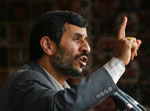 Wall Street Journal: With his nuclear brinksmanship and inflammatory public rhetoric, Iran’s firebrand president is accustomed to hogging the international spotlight. But recent days have seen him making news for a different reason entirely. The Wall Street Journal
Wall Street Journal: With his nuclear brinksmanship and inflammatory public rhetoric, Iran’s firebrand president is accustomed to hogging the international spotlight. But recent days have seen him making news for a different reason entirely. The Wall Street Journal
For the regime in Tehran, the Iranian president makes a convenient scapegoat for the plummeting rial and dire economic conditions.
By ILAN BERMAN
 You’ve got to feel a little sorry for Mahmoud Ahmadinejad. With his nuclear brinksmanship and inflammatory public rhetoric, Iran’s firebrand president is accustomed to hogging the international spotlight. But recent days have seen him making news for a different reason entirely. Ahmadinejad is now fighting for his political life against domestic opponents who blame him for the country’s current fiscal crisis.
You’ve got to feel a little sorry for Mahmoud Ahmadinejad. With his nuclear brinksmanship and inflammatory public rhetoric, Iran’s firebrand president is accustomed to hogging the international spotlight. But recent days have seen him making news for a different reason entirely. Ahmadinejad is now fighting for his political life against domestic opponents who blame him for the country’s current fiscal crisis.
The trouble began on Oct. 1, when Iran’s national currency, the rial, plummeted some 17%, collapsing to a value of 34,700 to one U.S. dollar. The devaluation was not totally unexpected: The rial had been in steady decline over the past year as Western sanctions began to bite. Even so, the Oct. 1 plunge was unprecedented in its scope and devastating in its socioeconomic impact. Mass protests erupted in Tehran, forcing authorities to deploy riot police and resulting in skirmishes between civilians and security forces.
Since then, regime officials have announced a plan to crack down on speculators and black-market money changers in an effort to discourage a run on the rial. Illegal currency traders have been rounded up as cautionary examples.
But the long knives are out for Iran’s president as well. Most recently, some 93 members of Iran’s legislature, the Majlis, have issued a motion summoning Ahmadinejad to appear before them for a public accounting of his response to the economic crisis. Regime officials have also taken aim at the president, accusing him of firing competent ministers and playing politics with key government posts under his control.
For the Iranian regime, desperately trying to get a handle on the plummeting national currency, Ahmadinejad makes a convenient scapegoat on several fronts.
First, Iran’s president is no longer a favorite of the country’s clerical establishment. The past two years have seen the emergence of a real rift between Ahmadinejad and his onetime political protector, Supreme Leader Ali Khamenei, on a range of social, economic and political issues. So profound has this rupture become that Ahmadinejad and his followers are now pejoratively referred to as the “deviant current.” Calls for their ouster from national politics were commonplace even before the rial crisis.
Ahmadinejad, secondly, has a long track record of ruinous fiscal policies—ones that almost certainly have made the current crisis worse, perhaps significantly. During his nearly eight years in office, Iran’s president has increased government spending, doubled down on the regime’s extensive and costly domestic economic subsidies, and promoted “Islamic” banking rates that have made the country’s financial institutions increasingly uncompetitive. He has done so, moreover, against the advice of domestic experts and leading economists alike, generating no shortage of popular ill will in the process.
Lastly, Ahmadinejad is already on his way out. He is nearing the end of his second term and cannot run for a third in next summer’s elections. And thanks to his very public falling-out with the Supreme Leader, Ahmadinejad is no longer a serious contender for any government appointments or political posts following his presidency. This means, in political terms, that making an example out of him will likely prove cost-free.
None of this will help to ameliorate Iran’s current crisis, or to solve the dire economic straits that ordinary Iranians find themselves in as a result of the regime’s nuclear ambitions. But scapegoating Ahmadinejad—and administering a healthy dose of domestic repression—may help the regime to quell popular discontent as it tries to right the economy. The ayatollahs, at least, are banking on it.
Mr. Berman is vice president of the American Foreign Policy Council in Washington, D.C.


